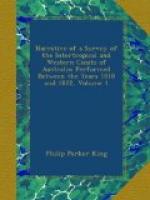(Footnote. At this place the San Antonio merchant brig wooded and watered in 1820.)
December 27 to 28.
Our watering continued to proceed without molestation from the natives; the number of whom had increased to twenty-nine, besides some whom we had before seen that were now absent. During the afternoon of the 28th the wind freshened from south-west and blew so strong as to cause a considerable swell where we were lying; but towards sunset the breeze moderated and the natives were again admitted on board; there were, however, only eleven, for the rest, having worn out their patience, had walked away.
They were now quite tractable and never persisted in doing anything against our wishes. The words “by and by” were so often used by us in answer to their cau-wah, or “come here,” that their meaning was perfectly understood and always satisfied the natives, since we made it a strict rule never to disappoint them of anything that was promised, an attention to which is of the utmost importance in communicating with savages. Every evening that they visited us they received something, but as a biscuit was the most valuable present that could be made, each native was always presented with one upon his leaving the vessel; during the day they were busily occupied in manufacturing spears, knives, and hammers, for the evening’s barter; and when they came in the morning they generally brought a large collection, which their wives had probably made in their absence.
December 29.
On the 29th we had completed our holds with wood and water and prepared to leave the harbour. In the morning there was thirteen feet water at the buoy which had been moored on the deepest part of the bar, the depth of which, during the two preceding days, had been frequently sounded.
In the evening we were visited by twenty-four natives among whom was our friend Jack. When they found us preparing to go away they expressed great sorrow at our departure, particularly Jack, who was more than usually entertaining but kept, as he always did, at a distance from his companions and treated them with the greatest disdain. When the time came to send them on shore he endeavoured to avoid accompanying them and as usual was the last to go into the boat; instead however of following them, he went into a boat on the opposite side of the brig that was preparing to go for a load of water, evidently expecting to be allowed to return in her.
This friendly Indian had become a great favourite with us all and was allowed to visit us whenever he chose and to do as he pleased; he always wore the shirt that had been given to him on the first day and endeavoured to imitate everything that our people were employed upon; particularly the carpenter and the sailmaker at their work: he was the only native who did not manufacture spears for barter, for he was evidently convinced of the superiority of our weapons and laughed heartily whenever a bad and carelessly-made




